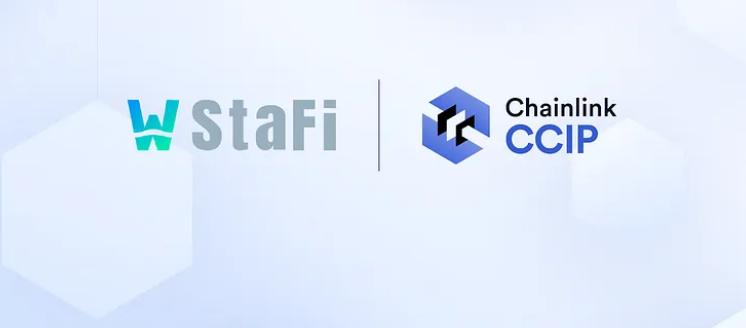We’re excited to announce that StaFi has integrated Chainlink CCIP — the industry standard for secure cross-chain interoperability — across the Arbitrum, Ethereum, and Polygon mainnets. We’re leveraging CCIP’s arbitrary messaging functionality to help us build cross-chain asset rate synchronization, helping enable staking rates to be sent from Ethereum to Arbitrum and Polygon.
We are also utilizing Chainlink Automation to help securely and cost-efficiently trigger the RateSender contract on Ethereum mainnet. As a result, the most recent rates for rETH and rMATIC can be securely transmitted to Arbitrum and Polygon via CCIP.
We selected CCIP as our go-to interoperability solution because Chainlink has a proven track record of maintaining the highest standard of security and reliability in the Web3 industry. Furthermore, CCIP is backed by the Risk Management Network — a separate, independent network that continually monitors and verifies cross-chain operations for suspicious activity. This additional layer of security is particularly important given historical industry exploits and the billions in user funds lost due to insecure and unreliable cross-chain infrastructure.
Chainlink Automation is a decentralized service purpose-built to manage tasks on behalf of smart contracts. Chainlink Automation leverages decentralized, hyper-reliable, and economically incentivized automation nodes to wake up smart contracts when they need to perform critical on-chain functions, which usually take place at regular time intervals (e.g., every day at the same time) or based on external events (e.g., when an asset hits a specific price).
StaFi is a multi-chain liquid staking protocol. We enable users to benefit from staking while still participating in DeFi across the Web3 ecosystem, all without having to lock their assets or worry about maintaining infrastructure.
In order to help secure our cross-chain liquid staking protocol, we needed access to a highly secure and reliable interoperability solution. After reviewing various solutions, we integrated Chainlink CCIP because it provides a multitude of important benefits and features, such as:
- Time-tested security and reliability — CCIP’s consensus and messaging layer is powered by Chainlink decentralized oracle networks, which have already secured tens of billions of dollars for smart contracts and enabled over $8 trillion in onchain transaction value. CCIP also features additional layers of protection and reliability via the Risk Management Network and Smart Execution.
- Seamless integration — CCIP offers a unified cross-chain developer experience by providing a single, easy-to-integrate interface. Developers only need to integrate the CCIP Router onchain to start building secure cross-chain applications.
- Scalable architecture — CCIP eliminates the need for developers to write custom code for chain-specific integrations, while users can interact with any blockchain via a single interface.
- Future-proof — CCIP is built to support continuous updates, such as the integration of new blockchains, the introduction of advanced functionalities, and the addition of other defense-in-depth approaches to security. Thus, integrating with CCIP eliminates future switching costs should new cross-chain functionalities be needed.
“We’re excited to be using Chainlink CCIP and Automation to help power asset rate synchronization on our liquid staking protocol across Ethereum, Arbitrum, and Polygon. Through the use of multiple Chainlink services, we were able to significantly advance the functionality of our protocol without compromising on security.” — Liam Young, the Co-Founder of StaFi
About Chainlink
Chainlink is the industry-standard Web3 services platform that has enabled trillions of dollars in transaction volume across DeFi, insurance, gaming, NFTs, and other major industries. As the leading decentralized oracle network, Chainlink enables developers to build feature-rich Web3 applications with seamless access to real-world data and offchain computation across any blockchain and provides global enterprises with a universal gateway to all blockchains.
Learn more about Chainlink by visiting chain.link or reading the developer documentation at docs.chain.link. To discuss an integration, reach out to an expert.
About StaFi
StaFi protocol is the first liquid staking protocol for multiple POS blockchains. StaFi aims to solve the contradiction between Mainnet security and token liquidity in PoS consensus.
Users can stake PoS tokens through StaFi and receive rTokens in return, which are available for trading, while still earning staking rewards. rToken is a synthetic staking derivative issued by StaFi to users when users stake PoS tokens through StaFi rToken App . rTokens are anchored to the PoS tokens staked by users and the corresponding staking rewards. rTokens can be transferred and traded at any time.
To date, the platform has released up to 10 various liquid staking solutions including rETH (StaFi Staked ETH), rMATIC, rBNB, rATOM, among others.
 English
English
 Deutsch
Deutsch
 Español
Español
 Français
Français
 Português
Português
 日本
日本
 한국인
한국인
 Türkçe
Türkçe
 Русский
Русский
 Tiếng Việt
Tiếng Việt














